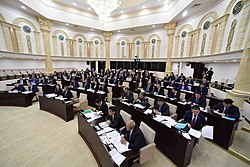
Back مجلس الشيوخ (كازاخستان) Arabic Qazaxıstan Senatı Azerbaijani Сенат на Казахстан Bulgarian Senat der Republik Kasachstan German Senado de Kazajistán Spanish مجلس سنای قزاقستان Persian Sénat (Kazakhstan) French Senat Kazakhstan ID Senato (Kazakistan) Italian Қазақстан Парламентінің Сенаты Kazakh
This article needs additional citations for verification. (April 2021) |
Senate Senat | |
|---|---|
| 8th Senate | |
 | |
| Type | |
| Type | |
| History | |
| Founded | 1996 |
| Preceded by | Supreme Soviet |
| Leadership | |
| Structure | |
| Seats | 50 |
 | |
Political groups | Independents (40)
Nominated members (10) |
Length of term | 6 years |
| Elections | |
| 40 seats indirectly elected by the local mäslihats, 10 are appointed by the President | |
Last election | 14 January 2023 |
Next election | 2026 |
| Meeting place | |
 | |
| Astana, Kazakhstan | |
| Website | |
| http://www.parlam.kz/en/ | |
 |
|---|
|
|
|
The Senate of Kazakhstan (Kazakh: Qazaqstan Parlamentınıñ Senaty, Қазақстан Парламентінің Сенаты, [qɑzɑqstɑn pɑrɫɑmʲentɘnɘŋ sʲenɑtɯ]) is the upper house of two chambers in Kazakhstan's legislature, known as the Parliament (Parlamenti). The Senate is composed of elected members: two from each region and two from three municipalities which are Almaty, Astana, and Shymkent.
Deputies of the Senate are elected through indirect suffrage by secret ballot. Local legislative bodies (mäslihats) elect senators, while half of the elected members are up for re-election every three years, ensuring continuous turnover while maintaining institutional stability. Additionally, ten members of the Senate are appointed by the president of Kazakhstan, ensuring that various national, cultural, and professional communities are adequately represented.[1]
The Senate serves as a check on the legislative process, with a key responsibility of reviewing and amending laws passed by the Mäjilis, the lower house of Parliament. It also plays an important role in approving presidential appointments to high government positions, such as judges, the prosecutor general, and members of the Constitutional Court. The Senate also has authority over certain presidential decrees, particularly those related to military force, the declaration of a state of emergency, and other matters affecting national security and governance.
Senators serve six-year terms, contributing to a more stable and long-term approach to legislative oversight and policy-making. In addition to its legislative functions, the Senate also represents the interests of Kazakhstan's regions, providing a platform for local concerns and perspectives within the national legislative framework. This dual approach—through direct elections and presidential appointments—ensures a balanced representation of both regional and national interests within Kazakhstan's political system.
- ^ "Parliament of the Republic of Kazakhstan". iacis.ru. Archived from the original on July 2, 2014.